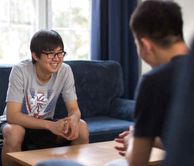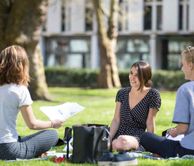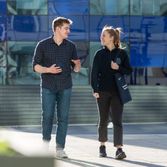Accordion
- Course information for October 2024 entry
- Course handbooks
- Computer Requirements for the course
- Preparation for the start of term
- ATAS Certificate and official documents
- Frequently asked questions
Please find the up-to-date course information for 2024 entry.
| Materials Science and Engineering | Materials with Nuclear Engineering |
|---|---|
|
Biomaterials and Tissue Engineering |
Materials with Management |
| BEng - UCAS J5N2 - ECTS: 180 - 3 yrs |
|
Please find our sample course handbooks for Year 1 and Year 2 below:
Course handbook: Year 1
Course handbook: Year 2
These course handbooks feature detailed module listing, reading lists and other information which you may find useful to read before joining us.
You will need a laptop for some classes and coursework. The laptop must meet the following minimum specification:
- Windows 10 capable
- Intel i5/i7 6th/7th generation processor
- 16GB RAM
- 256 GB SSD HDD
- Webcam
You will be taught and expected to use software such as SolidWorks® 2019, CES Edupack 2019 and Mindview 7 among others from Year 1 onwards. This software will be available to download for free from the Imperial Software Hub, when you enrol as a student. Using this software on a windows-based system with 16GB RAM and a basic graphics card will lead to a better experience*
*Please be aware that some of this software is NOT compatible with Mac/Apple OS.
Computers on campus and remote access
The Department has a number of laptops available for loan. These will be on a short-term basis for those who meet specific criteria.
Please also note that Imperial has allowed students to ‘remote access’ computers in the library, so if you have a stable internet connection, you will be able to use these software on a college PC.
If you are on the South Kensington campus, there are multiple venues to access a computer.
Hybrid tablet laptops
During a recent survey, some of our current students said they preferred having a 'tablet style' laptop for easier annotation of slides/notes during the lectures (as all lecture notes/slides are provided as pdf's prior to the lecture).
This is not essential, however you may find a hybrid laptop/tablet (similar to a Surface Pro) useful for you studies.
Alternatively, you are welcome to use a tablet and a laptop separately, if you would rather not use a hybrid tablet/laptop.
We would like you to relax and enjoy your summer before you embark on your journey with us at Imperial Materials. You will receive a Welcome pack with relevant details in early September to get you ready.
However if you would like to delve into the world of Materials Science and Engineering before you start, please see the suggestions below:
Books to get you prepared for the course:
Concepts of Materials Science - Adrian P. Sutton
Materials Science and Engineering: An Introduction, 10th Edition - William D. Callister Jr. David G. Rethwisch
Both books are available as e-books from the Imperial College Abdus Salam Library – once you have been confirmed, enrolled, and activated your college account (have a college username and password), you will be able to access these and other books.
Other Reading:
Handmade: A Scientist's Search for Meaning through Making - Anna Ploszajski
Material World – Ed Conway
The Alchemy of Us - Ainissa Ramirez
The New Science of Strong Materials - J. E. Gordon
Stuff Matters - Mark Miodownik
To watch:
Making stuff – David Pogue
In NOVA's four-hour series, "Making Stuff," popular technology columnist David Pogue takes viewers on a fun-filled tour of the material world we live in, and the one that may lie ahead. Get a behind-the-scenes look at scientific innovations ushering in a new generation of materials that are stronger, smaller, cleaner, and smarter than anything we've ever seen.
Engineering Connections – Richard Hammond originally broadcast on the National Geographic Channel, and later on BBC2. Now available on You Tube and other platforms.
To Listen:
Smart Materials
The Frontiers of Materials
How to discover the materials of the future
A new way to grow bone
9 Materials of the Future that Will Change the World
If you enjoy watching science programmes, then The Royal Institution has lots of talks that might interest you.
ATAS Certificate |
Submitting Official Documents |
|---|---|
|
You will need to apply for an ATAS certificate from the Foreign and Commonwealth Office if this is part of your offer condition. Information on how to apply for ATAS is available on the gov.uk website. Further information on applying for ATAS, from the International Student Support Team including FAQ’s and guidance can be found on the College website. Please refer to this and our departmental guidance before you start your application You apply for an ATAS certificate on the gov.uk website. Please read this ATAS Certificate Guidance 2024 before applying. PLEASE NOTE: ATAS is only valid for 6 months and must be valid at the start of the course. We advise that you do not submit your ATAS application before April. |
Documents including your official A-Level certificates (or secondary leaving certificate equivalent), English Language Certificates and ATAS Certificate must be sent by email (as pdf documents), directly to the Imperial College London Registry Team.
|
How many students are in Year One?
We usually have an intake of approximately 100 students per year.
What is the workload like for a Materials student?
The college expects full commitment from its students, and the course is difficult. Lectures, workshops, labs and tutorial all happen between 9:00 to 17:00 on Mondays to Fridays. Unlike school, we do not timetable self-study. We organise lectures, lab classes, tutorials and problem classes and any time outside of this is yours to use as you wish.
There is also time in the programme (such as evenings, Wednesday afternoons and weekends) which allows students to explore sports or one of our many societies. Most students are engaged in societies and use this to grow their skills and improve mental health. Please see the list of societies available.
Is there a large gap between A-Levels and the first year at University?
No, the first-year courses are built on knowledge gained during A Levels/IB/AP. The courses will get harder as the course progresses, but if you attend the lectures, workshops and tutorials, this will support you. Our lecturers are also very approachable and will support if you are having difficulties.
How many students pursue a Masters Degree or PhD after they graduate?
Around 2/3 of our year groups continue to complete the MEng programmes. A few students chose to complete a BEng degree and then pursue a Masters at another institution. Ultimately this will depend on your interests and what you would like to focus on at University.
How friendly and helpful is the Materials community at Imperial?
Materials is a small community, so everyone is very helpful and supportive. Our Faculty are very approachable, and our Professional Service Staff are always willing to help you.
Does the Materials Department have a 'year abroad' option?
There is no specific course that includes a year abroad. However, a select number of high-performing students can apply to attend a semesters exchange at MIT in their 4th year.
Can you please tell us more about Year 3 placement and UROP?
The placements are usually self-organised. However, there is plenty of help available from your Personal Tutor, Departmental Placement Coordinator and the college Careers Service. You can also approach lecturers who have industrial connections, and they are often happy to help students. Students can complete a UROP at any time during their study. You can hear from our students about their own experience and visit the College UROP webpage for further details on applying.
What are the benefits of taking horizon modules and is compulsory?
Horizons is usually done outside of normal study hours and is used to gain extra qualifications. Examples of horizon's modules include languages, presentation skills etc. This is not compulsory unless you have elected to complete the modules for credit. i-Explore is a new module which allows students to take cross-department or horizons modules in their 3rd year as part of the course.
How do the tutor groups work?
Our tutor groups usually have 4-5 students per group, and you are assigned a tutor throughout your entire degree. Your tutor will support with pastoral matters. You will also be assigned a Maths tutor in the first year, who will work on 'group problem' classes with you. Our workshops combine several tutor groups to form 20 student groups. Here you will have the opportunity to discuss the questions that are pre-released by a lecturer and learn to problem-solve together.
What can you advise for A-Level/IB students as we haven't done the exams?
For offer holders starting in 2021, more information will be communicated when we have a clearer picture of 2021. As everyone will be in similar positions, our lecturers will ensure to fill in any gaps in knowledge.
Are there a list of topics from Physics and/or Chemistry to learn before the start of term?
More information will be shared nearer the time for 2021 offer holders. However, we encourage you to look at some of the suggestions in our April Newsletter 2020, which can be found in the sidebar of this webpage. Our April communications outlines Coursera links with topics that we would like you to be aware of.
Can I use a Macbook for my study?
Windows is usually required to run a range of scientific specific software, such as SolidWorks. However, you will be able to borrow a laptop from the student office or use a university in-house computers if you need to.
Which programmes are available for students to gain exposure to entrepreneurship?
As part of our new course, we run in-house business based modules which will include entrepreneurship. Alternatively, Imperial Business School offers courses on entrepreneurship that can be taken as cross-department courses in your 3rd and 4th year. The Horizons programme can also be taken outside of your course. Please also find details of our Materials with Management course.
Which particular companies work with the Department?
Rolls Royce, BP, Shell, DSTL are some of the big companies which work with our Department. There are also many more that sponsor our students and lecturers.






